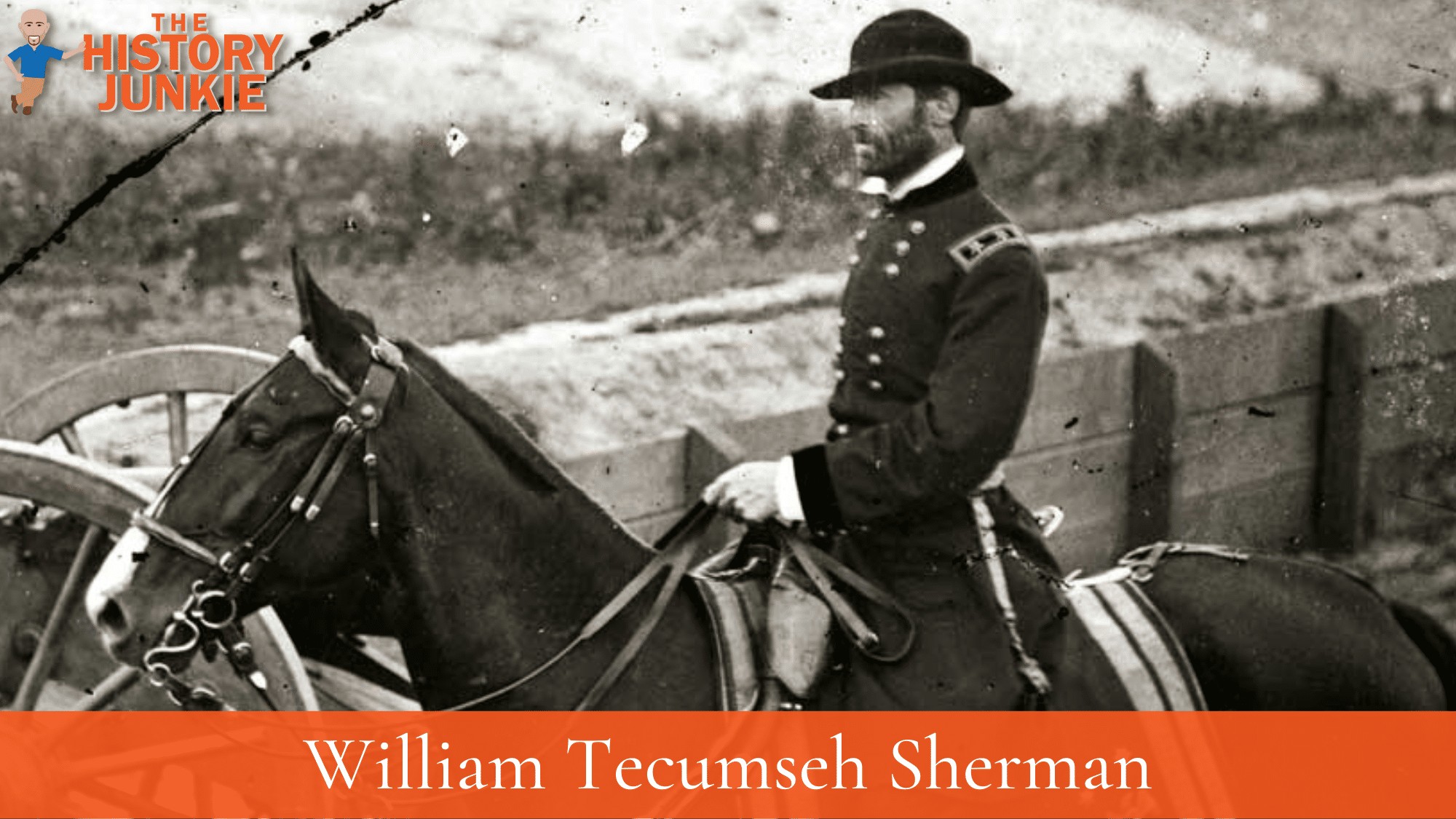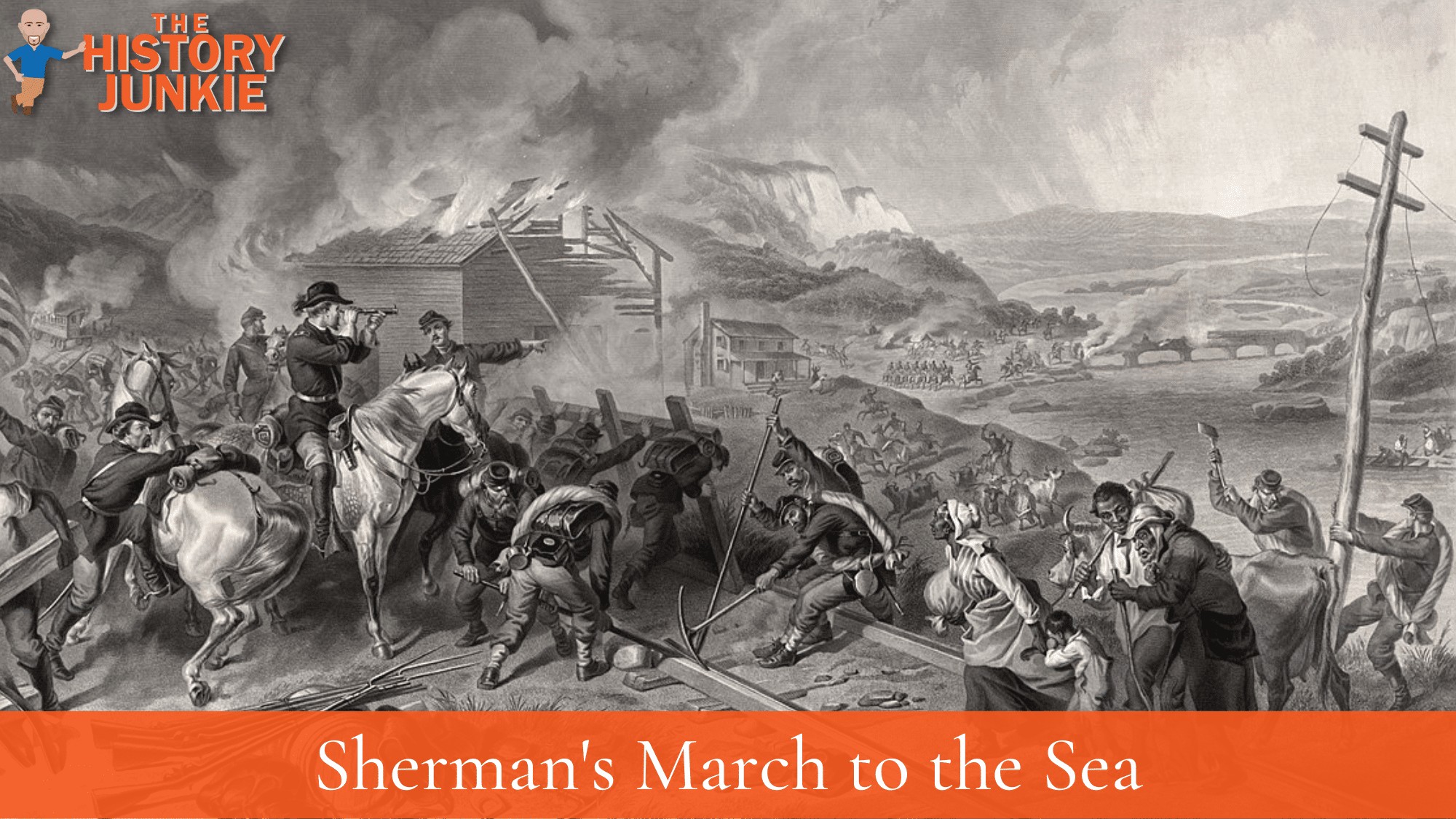William Tecumseh Sherman was a war machine, but he did not start out that way. He was one of the first to believe that the Civil War would be a long war with many casualties, but had some mental health issues that would sideline him for a time.

Born in Ohio into a politically prominent family, William Tecumseh Sherman graduated in 1840 from the United States Military Academy at West Point.
He interrupted his military career in 1853 to pursue private business ventures without much success. In 1859, he became superintendent of the Louisiana State Seminary of Learning & Military Academy, a position from which he resigned when Louisiana seceded from the Union.
Jump to:
Sherman commanded a brigade of volunteers at the First Battle of Bull Run in 1861 before being transferred to the Western Theater.
He was stationed in Kentucky, where his pessimism about the outlook of the war led to a breakdown that required him to be briefly put on leave.
He recovered and forged a close partnership with General Ulysses S. Grant. Sherman served under Grant in 1862 and 1863 in the Battle of Fort Henry and the Battle of Fort Donelson, the Battle of Shiloh, the campaigns that led to the fall of the Confederate stronghold of Vicksburg on the Mississippi River, and the Chattanooga campaign, which culminated with the routing of the Confederate armies in the state of Tennessee.
In 1864, when Grant went east to serve as the General-in-Chief of the Union Armies, Sherman succeeded him as the commander in the Western Theater.
He led the capture of the strategic city of Atlanta, a military success that contributed to the re-election of President Abraham Lincoln. Sherman lost his good friend, General James McPherson, in the Battle for Atlanta.

Sherman's famous "March to the Sea" through Georgia and the Carolinas involved little fighting but large-scale destruction of military and civilian infrastructure, a systematic policy intended to undermine the ability and willingness of the Confederacy to continue fighting.
Sherman accepted the surrender of all the Confederate armies in the Carolinas, Georgia, and Florida in April 1865, but the terms that he negotiated were considered too generous by U.S. Secretary of War Edwin Stanton, who ordered General Grant to modify them.
When Grant became President of the United States in March 1869, Sherman succeeded him as Commanding General of the Army.
Sherman served in that capacity from 1869 until 1883 and was responsible for the U.S. Army's engagement in the Indian Wars. He steadfastly refused to be drawn into party politics and, in 1875, published his memoirs, which became one of the best-known first-hand accounts of the Civil War. (Wikipedia)
Read Article: Famous Civil War Generals
Family Overview
Similar to Nathan Bedford Forrest, William Sherman's father died when he was young. Sherman was 9 years old, and although he was not the oldest, it did not help his development.
His mother and other family members helped raise the remaining siblings.
His siblings became successful. He had multiple brothers that ran successful businesses and had a career in politics. He had sisters who married into influential positions and used their influence to help their communities.
He married a wife that was similar to some of his sisters in that she was involved with many charities. She also had political connections.

He lost two of his children during the Civil War. One was an infant, and the other was Willie, who died from typhoid while with him during the war.
Many of his other children grew up to become successful in their vocation. He had some children who died in Europe in their old age.
Family Tree Chart
Parents:
Charles Robert Sherman (1788 - 1829) - He was born in Connecticut after the Revolutionary War and would die young in Ohio. His death was devastating to his family because they did not have another source of income.
Mary Hoyt (1787 - 1852) - She was born in Connecticut and married her husband in Connecticut. She and her husband had eleven children. She survived her husband by 23 years but died prior to her son becoming infamous due to the Civil War.
Spouse:
Eleanor Boyle Ewing (1824 - 1888) - She was known for her many philanthropic activities. She was the daughter of the Honorable Thomas Ewing, who served on the cabinet of President Zachary Taylor. The President & the entire cabinet attended her 1850 wedding to General Sherman, who had lived with the family since the death of his father in 1829.
Children:
Maria Ewing Sherman (1851 - 1913) - She married Thomas Fitch and had six children. Sherman's military comrades were at her wedding, which included President Ulysses Grant.
Mary Elizabeth Sherman (1852 - 1925) - She married in Lancaster, Ohio, but eventually moved closer to where her ancestors lived. She died in Boston, Massachusetts, but was buried in St. Louis, Missouri.
William Tecumseh Sherman Jr. (1854 - 1863) - "Willie" was the third child of General Sherman and his wife Eleanor. He was with his father in the campaign of the Mississippi & became a favorite of the troops. They made him honorary sergeant of the 13th. He died of typhoid fever in Memphis.
Thomas Ewing Sherman (1856 - 1933) - He was highly intelligent, graduating from Georgetown at age 18, then pursued a career in law by earning a degree from Yale two years later. Upon return to the family home in St. Louis, he looked after the considerable holdings of his famous father while reading law with a prominent St. Louis lawyer. Abruptly, he announced a calling for the priesthood.
Eleanor Mary Sherman (1859 - 1915) - She was from Lancaster, Ohio, but died in France. While living in Europe, she became sick and continued to work to help Serbia. The King of Serbia sent her a letter thanking her for her work. This would have occurred during World War 1.
Rachel Ewing Sherman (1861 - 1919) - She was born at the beginning of the Civil War. She married Paul Thorndike and had three children. She was buried Catholic, and her husband survived her for 20 years.
Charles Celestine Sherman (1864) - He died as an infant. This was the second child of Sherman's to die during the Civil War.
Philemon Tecumseh Sherman (1867 - 1941) - He was the only child to be born post-Civil War. He and his father became close, and his father was around more often. He became a New York lawyer and was successful. It seems as though he never married or had any children.
Siblings:
Charles Taylor Sherman (1811 - 1879) - He married and had many children. He became a Judge of the United States District Court for the Northern District of Ohio In office.
Mary Elizabeth Sherman (1812 - 1900) - She and her husband had six children. She was an important member of the community and served many charities. Her husband was an attorney, and the couple had money. She decided to use it towards helping others. She had a large write-up when she died at 88 years of age.
Amelia Sherman (1816 - 1862) - She died during the Civil War. She and her husband had four children that carried on her legacy.
Julia Ann Sherman (1818 - 1842) - She married John Willick and had one son. Unfortunately, she and her son died within the same year.
Lampson Parker Sherman (1821 - 1900) - He did not attain the fame of his brother but became a successful printer, although he endured some hard times. He married twice and had ten children.
John Sherman (1823 - 1900) - He became a United States Senator and served 40 years in public service. Ironically, he was against the Spanish-American War, but at that point, his health was waning, and he retired from public life.
Susan Denman Sherman (1825 - 1876) - She married and had four children. Only her oldest, Minnie, survived until adulthood.
Hoyt Sherman (1827 - 1904) - When the Civil War began, he was appointed by President Abraham Lincoln as paymaster in the Union Army with the rank of major, holding the position for three years. He was one of the organizers of the Equitable Life Insurance Company of Iowa and, for many years, its general manager. That institution owes much of its stability and high standing to Major Sherman's reputation for integrity and skillful management.
